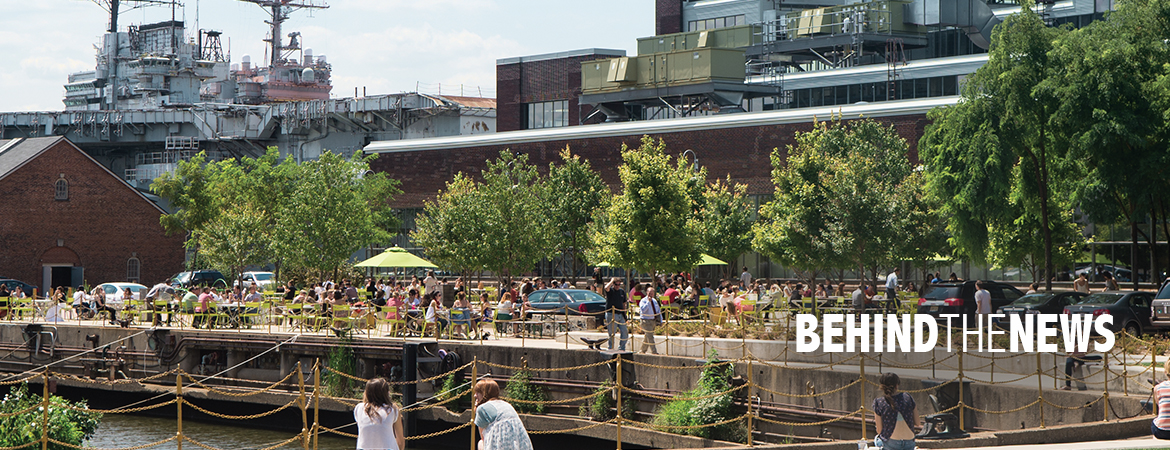
Ahoy, Employers
Ahoy, Employers
A decade ago, at the base of Broad Street where the Schuylkill and Delaware rivers meet, a former military base sat decaying. Today, 10,000 employees are working at the Navy Yard, and more are on the way.
Drexel LeBow alumnus Marc Vetri ’90, HD ‘13, is opening a new restaurant called The Brig in the old guardhouse right at the Navy Yard’s entrance next spring. Vetri will also move his offices to the campus.
You could say he’s following a trend started by a couple of Drexel University trustees.
In 2006, Urban Outfitters CEO Dick Hayne moved his companies (including Anthropologie and Free People) into retrofitted buildings there, becoming the site’s first high-profile tenant. Three years later, then-Tasty Baking Co. CEO Charles Pizzi moved the iconic Philadelphia snack company’s headquarters to the Yard.
LeBow economics instructor Steve Mullin says Urban’s arrival was an especially “transformative event,” after which the site’s growth really took off. “It gives it a cool factor, so businesses that need the services of the new, tech-savvy, Information Age workers find this an attractive place to be.”
GlaxoSmithKline is one of these businesses. Mullin says when the company’s executives toured Urban’s headquarters, they were immediately sold on the site. A few months ago, the pharmaceutical company moved 1,300 employees into sparkling new glass digs designed by Robert A.M. Stern Architects (which also designed the new Gerri C. LeBow Hall). Stern’s company conceived the master plan for the entire campus.
Each of the aforementioned companies employ Drexel co-ops and/or alumni, so hundreds of Drexel Dragons are among the 10,000-plus employees working at the Navy Yard on any given day.
“It gives it a cool factor, so businesses that need the services of the new, tech-savvy, Information Age workers find this an attractive place to be.”
Mullin was Philadelphia’s commerce director when the Navy largely pulled out of the site in the late 1990s. The land — comparable in size to all of Center City — and all of the infrastructure were turned over to the City.
Mullin’s company, Econsult Solutions Inc., calculates that those 10,000 Navy Yard jobs add up to about $3 billion in economic activity, which translates to more than $50 million in tax revenue for the city – with more on the way. Because the Navy Yard is a Keystone Opportunity Zone offering a 10-year city tax abatement, these companies are not yet paying property taxes, and Mullin says once those taxes come on board, “they will be significant.
“Redevelopment of the Navy Yard strengthens the core of the entire metropolitan economy.”
The Philadelphia Industrial Development Corp. issued an updated master plan earlier this year that proposes a goal of 30,000 jobs on the site, and Mullin thinks the city is on pace to meet that goal. “Overall, the development has turned out to be greater and faster than we had anticipated.”
A Marriott hotel is near completion, and plans for residential housing are being proposed. Mullin says “lots of retrofitted buildings, the cool architecture, the waterfront” would make the Yard a unique residential area.
Another big idea being discussed is extending the Broad Street Subway Line down to the Navy Yard. “That would be a great catalyst” for further growth, he says.


